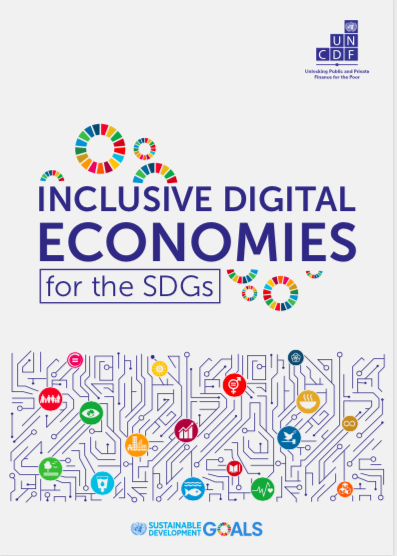Remarks of Preeti Sinha, UNCDF Executive Secretary, at the IDE4SDGs Publication Launch Event
Tags
As Prepared for Delivery
First, I would like to congratulate the UNCDF team on the release of their flagship publication on Inclusive Digital Economies for the SDGs
I would also like to thank the 15 contributors from international organizations who shared their insights on what it takes to build inclusive digital economies. And in particular two of these contributors, Ms. Cecile Billaux from the EU and Vincent Bagiire Permanent Secretary at the Ministry of ICT in Uganda who is represented here today by Julius Torach to discuss the digital transformation taking place in LDCs.
In the past two decades we have all witnessed a phenomenal change in the adoption of mobile and digital technology in emerging markets. The sector predicts that the unique mobile subscribers will reach 5.9 billion by 2025, equivalent to 71 percent of the world’s population.
Technology has dramatically changed how children are taught, jobs are created, health services are delivered, traders do business, farmers get access to information, financial services are delivered, and the list goes on.
To share how critical digital transformation is for the world’s 46 least developed countries, let me quote one of our partners in Senegal: M. Gueye the Director of CAURIE, a microfinance institution that serves 90,000 customers, 98% of whom are women in rural Senegal.
To open his remarks at a learning event with other financial service providers, he said “Either our microfinance institutions go digital, or we will soon die.”
His words truly express how eager his clients and his competitor financial institutions are for a new generation of financial services in Senegal. To the point, while his institution was transforming to digital, the number of mobile money users in Senegal more than doubled.
Overall, despite the positive and promising outcomes that have and are continuing to emerge, there is a growing concern that such outcomes will not be inclusive; particularly for the underserved communities in the world’s 46 least developed countries (LDCs).
In this regard there is one point we must always remember: Technology itself is neutral, and can lead to increased inclusion or exclusion, depending on how it is deployed. This could mean the difference between accelerating sustainable development and stunting it, particularly for the geographies that need it the most.
As the UN’s Flagship Financing Agency for the LDCs, we take a market systems development approach to build inclusive digital economies that leave no one behind.
This approach has UNCDF engaging with the entire ecosystem, from the public to the private sector, and has allowed us to address the various constraints of each market with the players themselves.
UNCDF’s market development approach also means that we look at both the supply side and the demand side for connectivity, particularly to ensure that the digital services delivered are truly inclusive.
On the supply side, we support innovation that provides relevant digital services and support the private sector to scale it up. Equally important is our work on the demand side to build the capability of consumers with digital literacy and digital skills as well as financial literacy.
Finally, these engagements leverage a range of instruments from technical assistance to knowledge sharing and exposure to more advanced markets in combination with grants, loans and investment.
Let me elaborate more on the last instrument I mentioned. UNCDF has a unique capital mandate that allows us to invest. These investments are critical for the development of inclusive digital economies that leave no one behind.
Over the past three years, UNCDF through the establishment of its LDC Investment Platform—which houses our on-balance sheet portfolio--has expanded its capacity to use financial instruments such as loans and guarantees in a strategic way to help unlock additional commercial investments,
Our portfolio spans the sectors of clean energy, financial inclusion, agribusiness, and women’s economic empowerment—and the portfolio value year-over-year has increased by 45%.
This unique capability in the United Nations system will be expanded in the coming years and can be further targeted at providing catalytic investments in early-stage digital economy businesses to demonstrate investment readiness and enable the private sector to access larger-scale blended or commercial finance.
Let me close by discussing the publication we are launching with today’s event--the first event of a series that will showcase our report to present the latest trends and opportunities resulting from increased access and usage of digital financial services and non-financial services in the LDCs.
UNCDF’s IDE4SDGs publication outlines how digital financial services and innovation can contribute to the emergence of new services in agriculture, energy, health, education, and digital services accessible via mobile phones and tablets—notably in areas of the world that would otherwise be left behind.
Chapter 4 of the publication in particular provides more insight on our financial instruments, which contribute to the emergence of inclusive digital economies. In short, you should consider this publication as a resource for the digital transformation of your country and organization.
Finally, I always say that capital should serve humanity. Not the other way around. Let’s take the same approach to technology and finance. Let’s commit to making technology and finance work for humanity, and not the other way around.
Thank you.
